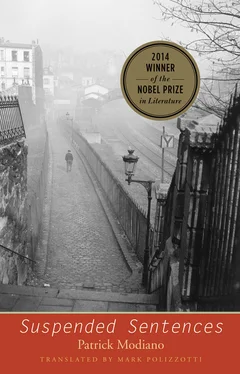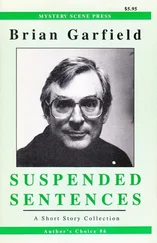It often happened that we spent entire days and nights on the lawns or in the foyers of the various pavilions. There was even a movie house and an auditorium in the Cité.
A holiday spa, or one of those international concessions like they had in Shanghai. That neutral zone, at the very edge of Paris, gave its residents diplomatic immunity. When we crossed the border with our fake identity cards, we were safe from all harm.
I met Pacheco at the Cité Universitaire. I had already noticed him a few months earlier. In January of that year, there had been a lot of snow, and the Cité looked like a winter resort. On several occasions I had crossed paths, on Boulevard Jourdan, with a man of about fifty wearing a faded brown coat whose sleeves were too long, black corduroy trousers, and snow boots. His brown hair was brushed back and his cheeks bore several days’ stubble. He walked cautiously, as if with every step he were afraid of skidding on the snow.
By the following June, he was no longer the same. His tan linen suit, sky-blue shirt, and buckskin shoes seemed brand new. His shorter hair and smooth-shaven cheeks made him look younger. Did we strike up a conversation in the Cité Universitaire cafeteria, whose windows looked out on Boulevard Jourdan? Or across the street, at the Brasserie Babel? My sense is at the cafeteria, because of that airportlike ambiance that for me is indissociable from Pacheco: a décor of plastic and metal, the comings and goings of people speaking a multitude of languages, as if in transit. Moreover, that day Pacheco was carrying a black leather suitcase. And he told me he worked for Air France, without my quite understanding whether he was an airline steward or whether he had a desk at Orly. He lived in a room in the Pavillon des Provinces Françaises. And as I expressed surprise that he could be living at the Cité Universitaire at his age, he showed me a card saying he was enrolled in the Faculty of Sciences, on the site of the old Halle aux Vins.
I didn’t dare tell him that I already knew him by sight. Had he noticed me as well, that winter? Was he waiting for me to ask him about it? Or had he convinced himself that I could hardly make a connection between the tramp in snow boots and the man sitting opposite me? His blue eyes gave away none of his thoughts.
The silhouette with the faded brown overcoat and halting steps had melted with that year’s snow. And no one had noticed. Except me.
From then on, we met him at the Cité cafeteria or in the small restaurant on Avenue Reille that featured “Oriental” specialties. Our conversations were anodyne: he explained that he couldn’t take a full course load at the Faculty of Sciences because of his job. But what exactly was his job?
“Oh … I work as a kind of steward. Sometimes on board planes, or in the offices at Orly … or in the terminal at Invalides … Three days a week …”
He had fallen silent. I hadn’t pushed. He hung out with Moroccan students who lived in the first pavilion as you entered the Cité, just after the Charléty stadium. The Moroccans were with some very blond Scandinavian girls and two Cubans. With this group, we would go see a film on Saturday evenings and, often, we would gather in the room that one of the Scandinavian girls occupied at the Fondation Deutsch-de-la-Meurthe, a village composed of small pavilions with brick walls and ivy. Pacheco invited us all to dinner beneath the arbor of the restaurant on Avenue Reille, and at dessert he handed out presents—“duty free” cigarettes, perfumes, lighters that he procured at Orly.
Now and again we’d be joined by a tall, dark man who worked for Air Maroc and had lived at the Cité Universitaire a few years back. Pacheco used the familiar tu with him. It was probably through this fellow that he’d met the others. Pacheco took part in the group’s merriments, its jokes, the sunbathing on the lawns of the Cité. He joined in the conversations. But I always felt he was a bit removed, though I told myself it was because of the age difference between him and us.
One Sunday evening, he was alone in the cafeteria and he’d invited Jacqueline and me to have a pan-bagnat and an apple tart. I was on the point of asking him about the tramp with the faded overcoat from last winter, but I stopped myself. I only asked whether his name, Pacheco, was of Spanish or Portuguese origin.
“My father was Peruvian.”
He gazed at us one after the other, as if to reassure himself that there was no danger in sharing a confidence.
“My mother was half-Belgian, half-French. And, through her, I’m a descendant of Maréchal Victor.”
I confess that at the time I knew nothing about the marshal. I only knew that there was a Boulevard Victor, farther on, near the Porte de Versailles.
“Maréchal Victor was a marshal under the First Empire. Napoleon made him duc de Bellune.”
He had said it in a detached tone. He seemed to find it natural that the name Victor meant nothing to us.
“When I was younger, I used to go by the name Philippe de Bellune, but I had no real right to the title.”
So, his given name was Philippe. We had gotten used to calling him Pacheco, and for us, “Pacheco” acted as both first and last name.
“Why no right to the title?”
“The last duc de Bellune had only girls, one of whom was my grandmother, and the title became extinct. Are you really interested in this?”
“Yes.”
It was the first time he’d given me any personal information. Up until then, I’d had no reference points. The man was as slippery and elusive as his gaze. Even his age was hard to pin down: somewhere between thirty-five and fifty.
“That’s a nice name, ‘Philippe de Bellune.’ You should have kept calling yourself that.”
“You think so?”
He shrugged his shoulders and rested his blue eyes on me for a moment. The image of the tramp walking along Boulevard Jourdan in a faded brown coat came to mind: perhaps people knew him by the name Philippe de Bellune.
“When did you stop calling yourself Philippe de Bellune?”
“Are you sure you’re interested in this?”
A few of our Moroccan and Scandinavian friends came to sit at our table, and Pacheco regained his reserve. He joined in the conversation but spoke only in generalities. We left the cafeteria very late. Pacheco was carrying the black leather suitcase that I’d seen him with several times before.
We parted company in the foyer of the Pavillon des Provinces Françaises. The night was warm and Jacqueline and I went to sit on a bench surrounded by privet hedges, which sheltered us from prying eyes. This is probably why Pacheco didn’t notice us when he went out again ten minutes later, his black leather suitcase in hand. We held our breath. We both had the same thought: he only pretended to live in the Pavillon des Provinces Françaises, and the minute he was sure he wouldn’t run into anyone from our little group, he left the pavilion for an unknown destination.
We waited until he was about fifty yards ahead of us before starting to follow him. Exiting the Cité Universitaire, he turned left toward the Porte d’Orléans and his outline vanished in the night. Where could he be going? Where did he really live? I imagined him walking straight ahead, up to the Porte de Versailles, and finally reaching that desolate boulevard that bore the name of his ancestor. He walked along it slowly, suitcase in hand, like a sleepwalker, and at that late hour he was the only pedestrian.
We saw him again the next day, still just as well groomed in his tan linen suit and suede shoes. He was no longer carrying his valise, but rather a small, navy blue travel bag from British Airways slung across his shoulders. Our eyes met, his as vacant as ever. It was up to me to solve the enigma of that man. Pacheco. Philippe de Bellune. Using just those two names, I had to unearth other details about him. At around that time, to make some money, I had started buying and reselling batches of books, assorted documents, complete collections of magazines. On the off chance, I searched for the names Bellune and Pacheco in the indexes of old newspapers that passed through my hands, like a ragman poking his hook into a pile of garbage.
Читать дальше












